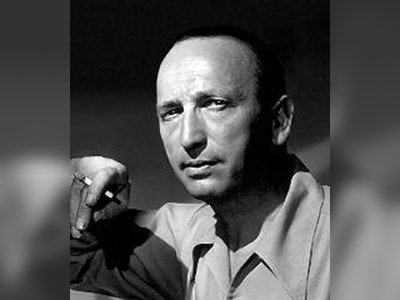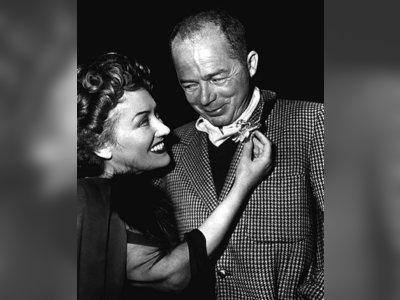Roman Polanski: A Life in Film and Controversy
Roman Polanski, born Rajmund Roman Thierry Polański on August 18, 1933, is a renowned French-Polish film director, screenwriter, and actor of Jewish heritage. He is best known for winning an Academy Award for his film "The Pianist." However, his career has been overshadowed by a notorious legal case in which he fled the United States after being charged with the statutory rape of a 13-year-old girl.
Early Life, Adolescence, and Family
Polanski was born as Rajmund Roman Thierry Liebling in Paris, France, to Ryszard and Bula (née Katz-Przedborska) Liebling, who later changed their family name to "Polanski." His father was Jewish, while his mother had a mixed Jewish-Catholic background. In 1937, the family returned to their native Poland. During World War II, Polanski's mother perished in Auschwitz, but his father survived the Mauthausen concentration camp. Polanski himself escaped from the Krakow Ghetto on March 24, 1943, and was hidden by Polish Catholic families under the name "Roman Wilk."
After the war, Polanski reunited with his father and began pursuing his dreams of a career in the film industry. He appeared on children's radio programs, attended an arts school, and, with the help of renowned Polish director Andrzej Wajda, gained admission to the Łódź Film School. Among his classmates were director Jerzy Skolimowski, composer Krzysztof Komeda, screenwriter Jerzy Gruza, and producer Gene Gutowski.
Polanski was considered a brilliant film student. After completing his studies in 1959, he directed his debut film, "Knife in the Water," which garnered international acclaim and earned him his first Oscar nomination.
In 1964, Polanski collaborated with actors like Claude Jade and Jean-Louis Trintignant in the film "The Dance of the Vampires." Although the film did not receive widespread critical acclaim, it marked the beginning of his partnership with screenwriter Gérard Brach, which lasted nearly thirty years until the film "Frantic."
In 1965, Polanski moved to the United Kingdom and directed "Repulsion," a dark and disturbing psychological horror film featuring Catherine Deneuve. A year later, he directed "Cul-de-Sac," a bleak black-and-white film about gangsters stranded on a remote island.
In 1967, Polanski created "The Fearless Vampire Killers," a dark comedy about bumbling vampire hunters. During the production, he met American actress Sharon Tate, whom he later married in 1968.
Tragedy struck in August 1969 while Polanski was in London. Members of Charles Manson's cult, known as the "Manson Family," broke into his Los Angeles home and brutally murdered his pregnant wife, Sharon Tate, along with several others. Polanski, devastated by the loss, returned to Europe shortly after her funeral.
In 1989, Polanski married actress Emmanuelle Seigner, and they later had two children, a daughter named Morgane and a son named Elvis. Polanski and his children primarily speak Polish at home.
Sexual Assault Charges and Flight to Europe
In 1977, Polanski faced charges in the United States for the statutory rape of a 13-year-old girl. He pleaded guilty to the charge of unlawful sexual intercourse with a minor, underwent psychiatric evaluation, and spent 42 days in jail before fleeing the country on February 1, 1978, just before his sentencing. He first went to the United Kingdom and then to France.
Since then, Polanski has avoided countries that might extradite him to the United States, including the UK. In September 2009, he was arrested in Switzerland at the request of U.S. authorities but was not extradited. In May 2018, the American Academy of Motion Picture Arts and Sciences expelled Polanski as part of its campaign against sexual misconduct in the industry.
In 2018, Polanski lost a defamation lawsuit filed against him by Israeli journalist and producer Matan Uziel and was ordered to pay Uziel 20,000 Israeli shekels in legal costs.
In 2017, actress Renate Langer accused Polanski of sexually assaulting her when she was 15 years old.
Early Films
Polanski's distinctive cinematic talent was evident from the beginning of his career. His debut feature film, "Knife in the Water" (1962), brought him international recognition and his first Oscar nomination. It was followed by a series of films, including "Two Men and a Wardrobe," the first commercially released Polish student film.
In 1965, Polanski moved to the United Kingdom, where he directed "Repulsion" (1965) and "Cul-de-Sac" (1966). "Repulsion" was a psychological horror film that received critical acclaim and established him as a prominent director.
Returning to Europe in the late 1960s, Polanski directed "Rosemary's Baby" (1968), a film about a woman who suspects a dark conspiracy surrounding her pregnancy. The film explored themes of paranoia and the revelation of hidden truths and earned Polanski worldwide recognition.
In 1971, he directed "Macbeth," a dark and violent adaptation of Shakespeare's play. This was followed by "What?" (1972), an absurd comedy.
Polanski then returned to the United States and directed "Chinatown" (1974), a neo-noir film starring Jack Nicholson and Faye Dunaway. The film explored themes of deceit and power and became a classic of American cinema. Polanski himself made a cameo appearance in the film as a man who cuts Nicholson's character, J.J. Gittes, stating that this is what happens to nosy people, symbolizing the film's psychological complexity.
A New Direction and Controversy
After "Chinatown," Polanski returned to Europe and directed "The Tenant" (1976), a psychological thriller in which he also played the lead role. The film had a dark and oppressive atmosphere and concluded with a disturbing ending, typical of Polanski's work.
In 1979, Polanski directed "Tess," an adaptation of Thomas Hardy's novel "Tess of the d'Urbervilles," starring Nastassja Kinski. The film received critical acclaim and earned Polanski three Oscars for cinematography, art direction, and costume design, as well as a César Award for Best Film. It marked a successful collaboration between Polanski and screenwriter Gerard Brach.
Despite the success of "Tess," Polanski faced challenges in securing funding for new projects, partly due to his inability to work in Hollywood because of his legal troubles. His next film, "Pirates," was released in 1986 and starred Walter Matthau. It was met with disappointment and was considered a commercial failure.
In 1988, Polanski directed "Frantic," a thriller starring Harrison Ford. This marked his return to Hollywood after years of exile, but the film received mixed reviews.
Despite facing personal and legal challenges throughout his life, Roman Polanski remains a prominent figure in the world of cinema, known for his unique storytelling and visual style. His films continue to be studied and celebrated for their artistic and thematic depth, although they are also sometimes overshadowed by the controversy surrounding his personal life.
Awards and Recognition
Throughout his career, Roman Polanski has received numerous awards and nominations for his work in film. Some of his most notable achievements include:
1. Academy Awards:
Best Director for "The Pianist" (2003).
Academy Award nominations for Best Director for "Chinatown" (1974) and "Tess" (1979).
2. Cannes Film Festival:
Palme d'Or (Golden Palm) for "The Pianist" (2002).
3. César Awards (France):
Best Director and Best Film for "Tess" (1980).
Best Director and Best Film for "The Ghost Writer" (2010).
4. BAFTA Awards:
Best Direction for "Chinatown" (1974).
BAFTA nominations for Best Direction for "The Pianist" (2003) and "Carnage" (2011).
Legacy
Roman Polanski's films are celebrated for their exploration of psychological and existential themes, often involving characters facing extreme situations and moral dilemmas. His distinctive visual style, characterized by meticulous attention to detail, innovative camera work, and evocative use of space, has left a lasting impact on cinema.
While Polanski's career achievements are undeniable, his personal life and legal troubles continue to be a subject of controversy and debate. His decision to flee the United States in the midst of legal proceedings has led to significant divides in public opinion, with some arguing that his artistic contributions should be separated from his actions, while others contend that his past misconduct should not be overlooked.
Ultimately, Roman Polanski's life and career remain a complex and polarizing topic, with discussions about his work often accompanied by discussions of the ethical and legal issues surrounding his personal life.
- רומן פולנסקיhe.wikipedia.org






